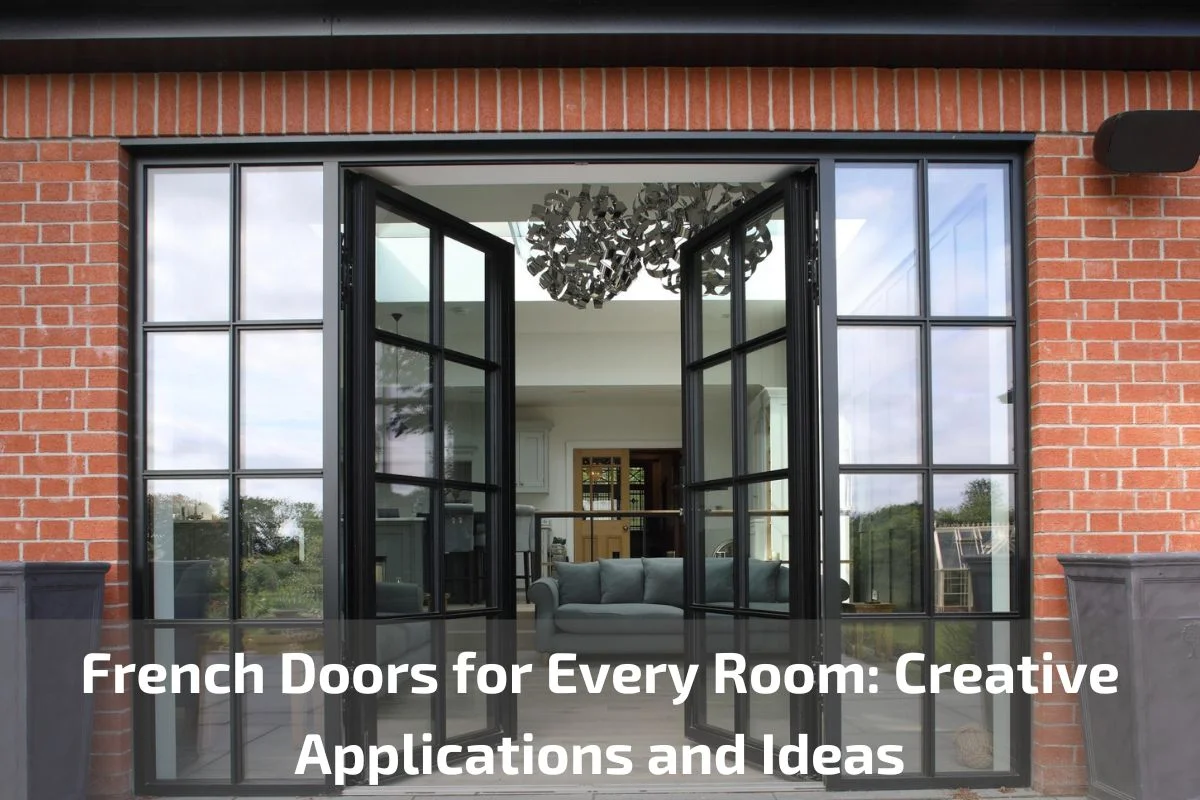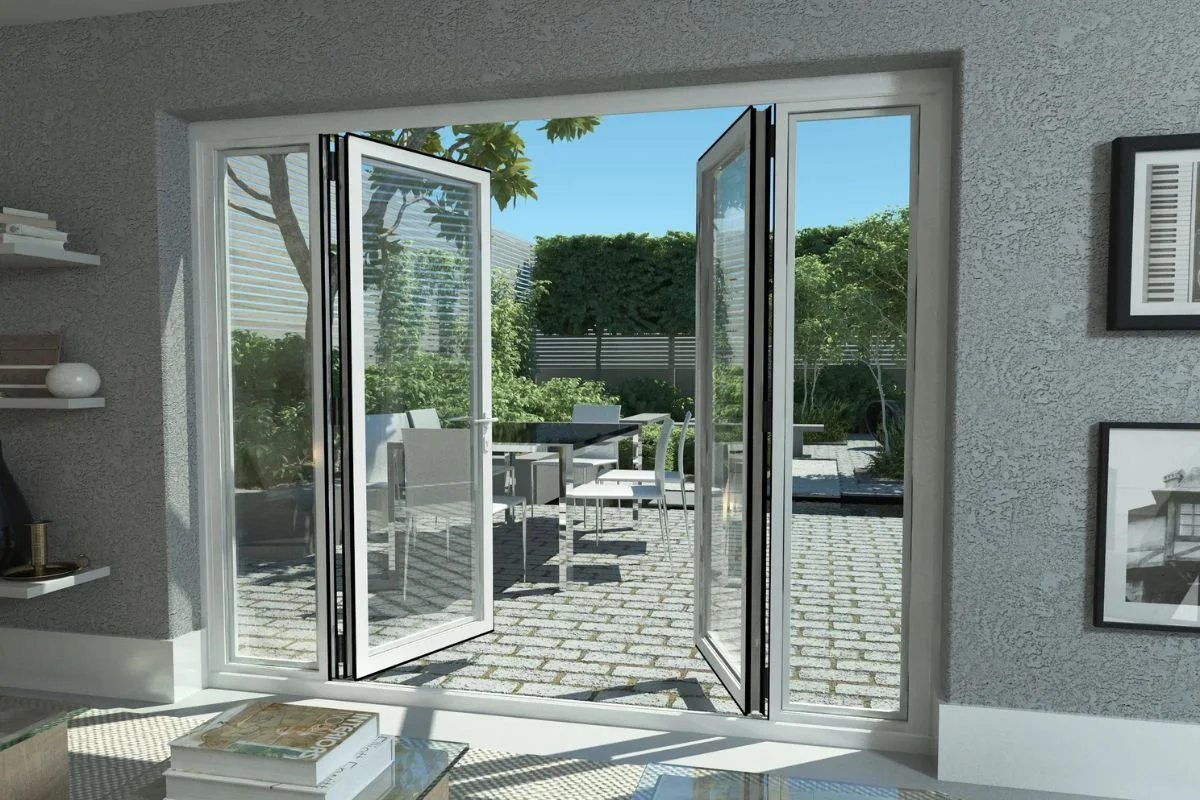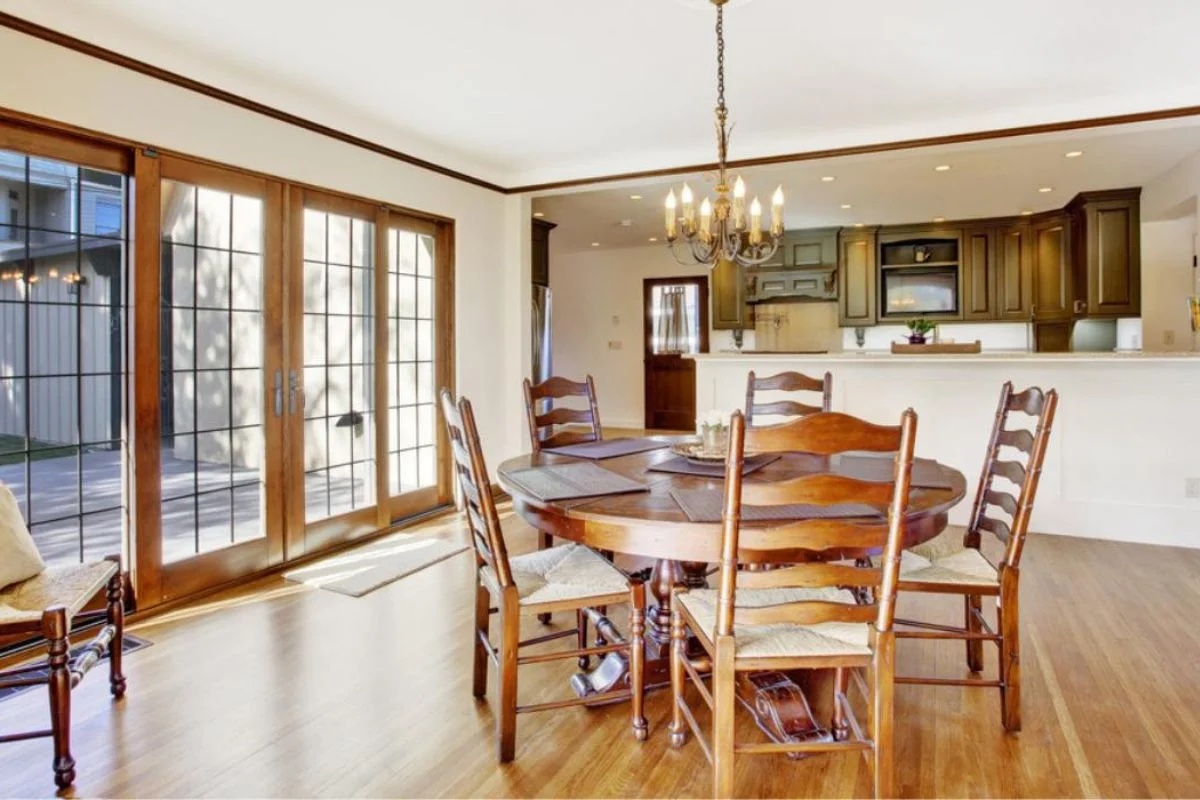
French doors are renowned for their timeless elegance, versatility, and ability to enhance the aesthetic appeal of any space. With their classic design and unique functionality, French doors have become a popular choice for homeowners looking to add charm and sophistication to their interiors.
In this article, we will explore the creative applications and innovative ideas for incorporating French doors into every room of your home. From the grandeur of the living room to the tranquility of the bedroom, French doors offer endless possibilities for enhancing both the style and functionality of your living spaces.
Join us as we delve into the world of French doors and discover how these iconic features can transform your home, creating seamless transitions between indoor and outdoor spaces while adding a touch of elegance and character to every room. Whether you’re renovating an existing space or designing a new home, French doors are sure to inspire your imagination and elevate the ambiance of your living environment.
Definition and Origin of French Doors
French doors are elegant and classic architectural elements characterized by their double-door design with glass panels extending the full length. These doors typically open outwards, creating a wide entrance that allows ample natural light and a seamless connection between indoor and outdoor spaces.
Originating in France during the Renaissance period, French doors were initially known as “porte-fenêtre,” which translates to “window-door” in English. They were popularized in French architecture during the 17th century and quickly gained popularity across Europe and beyond.
The design of French doors was influenced by the desire to bring more natural light into interior spaces while providing a graceful transition between rooms and outdoor areas such as gardens or balconies. Originally crafted from wood, French doors were adorned with intricate moldings and decorative details, reflecting the craftsmanship and sophistication of French artisans.
Over time, French doors evolved to incorporate various materials and designs to suit different architectural styles and preferences. Today, they remain a symbol of elegance and timeless beauty, enhancing the aesthetic appeal and functionality of both traditional and modern homes around the world.
Types and Designs of French Doors
French doors come in a variety of types and designs, offering versatility and elegance to complement various architectural styles and interior preferences. Here are some common types and designs of French doors:
Traditional Hinged French Doors:
Traditional hinged French doors feature two door panels that swing open from the center, typically operated with hinges attached to the door frame. They offer a classic and timeless look, often adorned with decorative glass panels and intricate molding details.
Folding French Doors:
Folding French doors, also known as accordion or bi-fold doors, consist of multiple panels that fold and stack neatly against one or both sides of the door frame when opened. They are ideal for maximizing space and creating a seamless transition between indoor and outdoor areas.
Sliding French Doors:
Sliding French doors feature two or more door panels that slide horizontally along tracks installed on the top and bottom of the door frame. They offer a sleek and contemporary look while providing easy operation and space-saving benefits.
Multi-panel French Doors:
Multi-panel French doors feature three or more door panels, each with its own glass panel, creating a stunning visual effect and allowing for maximum light penetration. They are often used in larger openings and grand entrances, adding elegance and sophistication to any space.
Customized French Doors:
Customized French doors offer endless possibilities for personalization and design creativity. Homeowners can choose from a variety of materials, finishes, and glass options to tailor the doors to their specific aesthetic preferences and functional needs.
Pocket French Doors:
Pocket French doors slide into a recessed pocket within the wall when opened, creating a seamless transition between rooms without taking up valuable floor space. They are ideal for smaller spaces or areas where swing clearance is limited.
Modern French Doors:
Modern French doors feature sleek lines, minimalist hardware, and contemporary finishes, offering a fresh and updated take on the traditional French door design. They are popular in modern and transitional interiors, adding a touch of sophistication and style.
Benefits of Installing French Doors
French doors offer numerous benefits that make them a popular choice for homeowners looking to enhance the beauty, functionality, and value of their homes. Here are some key advantages of installing French doors:
Abundant Natural Light: French doors feature large glass panels that allow ample natural light to enter the interior spaces, creating a bright and inviting atmosphere. This helps reduce the need for artificial lighting during the day, saving energy and lowering utility bills.
Indoor-Outdoor Connectivity: French doors seamlessly connect indoor and outdoor living spaces, blurring the boundaries between the interior and exterior of the home. They provide easy access to patios, decks, gardens, or balconies, allowing homeowners to enjoy outdoor activities and entertaining with ease.
Enhanced Views: With their expansive glass panels, French doors offer unobstructed views of the surrounding landscape, garden, or courtyard. They frame outdoor scenery like a piece of art, allowing homeowners to appreciate the beauty of their surroundings from the comfort of their home.
Space-saving Design: French doors open outward or slide along tracks, requiring minimal clearance space compared to traditional swinging doors. This makes them ideal for smaller rooms or areas where space is limited, as they do not intrude into the living space when opened.
Aesthetic Appeal: French doors add elegance, charm, and sophistication to any room or entryway. Their classic design, decorative glass panels, and intricate detailing enhance the architectural beauty of the home, creating a focal point that enhances curb appeal and resale value.
Ventilation and Airflow: French doors provide excellent ventilation and airflow when opened, allowing fresh air to circulate throughout the home. This helps regulate indoor temperature and improve indoor air quality, creating a comfortable and healthy living environment.
Versatility in Design: French doors come in a variety of designs, materials, and finishes to suit different architectural styles and interior preferences. Whether traditional or modern, wood or metal, homeowners can choose French doors that complement their home’s aesthetic and design scheme.
Privacy Options: While French doors are known for their transparency and openness, homeowners can customize them with various glass options, such as frosted, tinted, or textured glass, to enhance privacy and security without sacrificing natural light.
French Doors for Different Rooms
French doors offer versatility and elegance that make them suitable for various rooms throughout the home. Here are some ways French doors can enhance different spaces:
Living Room: French doors create a grand entrance to the living room, adding a touch of sophistication and charm. They allow natural light to flood the space, making it feel airy and inviting. French doors also provide easy access to outdoor entertaining areas, such as patios or gardens, extending the living space for gatherings and relaxation.
Dining Room: French doors can separate the dining room from adjacent spaces while maintaining an open and spacious feel. They allow natural light to illuminate the dining area, creating a warm and inviting ambiance for meals and gatherings. French doors also offer easy access to outdoor dining areas, making al fresco dining a breeze.
Bedroom: French doors add elegance and style to the bedroom while providing a seamless connection to outdoor spaces such as balconies or terraces. They allow natural light to filter into the bedroom, creating a tranquil and relaxing atmosphere. French doors in the bedroom offer privacy when closed while still maintaining a sense of openness and flow within the space.
Home Office or Study: French doors can create a sophisticated entrance to a home office or study, enhancing productivity and inspiration. They allow natural light to illuminate the workspace, creating a bright and inviting environment for work or study. French doors also provide privacy when needed, allowing for focused concentration and productivity.
Kitchen: French doors can serve as a charming entrance to the kitchen, creating a seamless transition from the dining or living area. They allow natural light to fill the kitchen space, making it feel bright and welcoming. French doors also provide easy access to outdoor dining or cooking areas, making them ideal for indoor-outdoor entertaining.
Master Suite: French doors can create a luxurious entrance to the master suite, adding elegance and style to the space. They allow natural light to illuminate the bedroom, creating a serene and inviting atmosphere. French doors in the master suite also provide easy access to outdoor retreats such as private gardens or patios, enhancing relaxation and comfort.
French Doors in Modern Interior Design Trends
French doors have evolved to adapt to modern interior design trends, offering a blend of classic elegance and contemporary functionality. Here are some ways French doors are incorporated into modern interior design:
Minimalist and Sleek Designs: In modern interior design, French doors often feature clean lines, minimalist hardware, and sleek finishes. This minimalist approach enhances the overall aesthetic of the space while maintaining the classic charm of French door design.
Large Glass Panels: Modern French doors often feature larger glass panels that maximize natural light and offer unobstructed views of the surrounding landscape. These expansive glass panels create a sense of openness and spaciousness in the interior, making the space feel bright and airy.
Energy-efficient Materials: With a growing emphasis on sustainability and energy efficiency, modern French doors are often constructed from eco-friendly materials such as fiberglass, vinyl, or aluminum. These materials offer excellent insulation properties, helping to reduce energy consumption and lower utility costs.
Smart Home Integration: In line with the rise of smart home technology, modern French doors may feature integrated smart locks, sensors, and connectivity options. Homeowners can control their French doors remotely via smartphone apps, allowing for convenient access and enhanced security.
Versatility in Applications: Modern French doors are versatile and can be used in various applications beyond traditional entryways. They are often used as interior partitions, room dividers, or even as shower enclosures in contemporary bathrooms. This versatility allows for creative and innovative design solutions in modern homes.
Innovative Glass Options: Modern French doors may feature innovative glass options such as low-e coatings, tinted glass, or textured glass for added privacy and energy efficiency. These glass options enhance the functionality of the doors while adding visual interest to the interior space.
Mixing Materials and Finishes: Modern interior design often embraces the mixing of materials and finishes to create visual contrast and depth. French doors with contrasting frames, hardware, or finishes can add a touch of drama and sophistication to the space, making them a focal point of the room.
Maintenance Tips for French Doors
Proper maintenance is essential to ensure that French doors remain functional, attractive, and durable over time. Here are some maintenance tips to keep French doors in optimal condition:
Regular Cleaning: Clean the glass panels, frames, and hardware of French doors regularly using a gentle cleanser and a soft cloth. Avoid abrasive cleaners or harsh chemicals that could damage the finish.
Inspect Weather Stripping: Check the weather stripping around the door frame for signs of wear, tear, or damage. Replace any worn weather stripping to maintain a tight seal and prevent drafts or air leaks.
Lubricate Moving Parts: Periodically lubricate the hinges, locks, and handles of French doors with a silicone-based lubricant to ensure smooth operation. Lubrication prevents squeaking, sticking, or jamming of moving parts.
Check for Water Damage: Inspect the door frame, threshold, and surrounding areas for signs of water damage, rot, or decay. Repair or replace any damaged components promptly to prevent further deterioration.
Adjust Door Alignment: Check the alignment of French doors to ensure that they open and close properly. Adjust the hinges or hardware as needed to correct any misalignment and ensure a snug fit within the door frame.
Protect Wooden Doors: If the French doors are made of wood, apply a protective sealant or wood preservative to prevent moisture absorption, rot, or warping. Reapply the sealant periodically to maintain the wood’s integrity.
Maintain Finish: If the doors have a painted or stained finish, inspect the finish regularly for chips, scratches, or fading. Touch up any imperfections with matching paint or stain to maintain the appearance of the doors.
Clear Debris from Tracks: Keep the tracks of sliding French doors free from dirt, debris, or obstructions. Use a vacuum or soft brush to remove any buildup that could interfere with the smooth operation of the doors.
Secure Hardware: Check the screws, bolts, and other hardware of French doors to ensure that they are securely fastened. Tighten any loose hardware to prevent accidents or malfunctions.
Monitor Glass Panels: Inspect the glass panels of French doors for cracks, chips, or damage. Replace any damaged glass panels promptly to maintain the structural integrity and safety of the doors.
Conclusion
In conclusion, French doors are more than just architectural elements; they are statements of elegance, functionality, and timeless beauty. With their classic design, versatile applications, and aesthetic appeal, French doors enhance the ambiance and livability of any space, whether traditional or modern.


